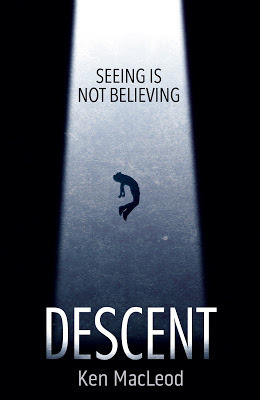Ken MacLeod's Blog, page 10
February 21, 2014
Scottish Independence and the Left
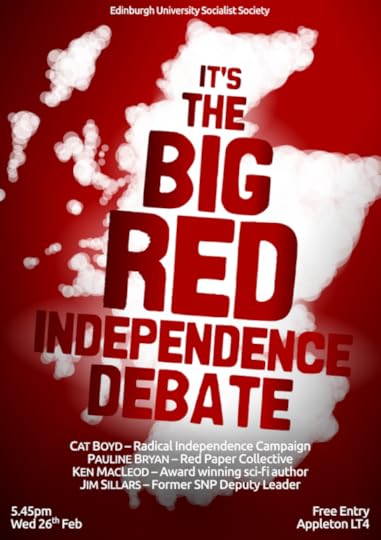
On this year’s MA Creative Writing course at Napier University about half the students come from the US or Germany, and at commencement last September I felt like telling them how lucky they were as writers to be spending the next year in a country whose future was up for grabs in that very year, and how the buzz of argument and excitement around them would light up their work for years to come. How often, outside of outright revolutionary situations, do writers have a chance to overhear or take part in passionate and wide-ranging debate about politics and society in every café or pub or bus queue?
If I’d said that, of course, the students from Scotland would have laughed in my face, and the students from other countries would by now have five months of perplexed disappointment behind them. This month, though, with a few polls showing a small shift to Yes followed (not coincidentally) by a drumbeat of solemn warnings from businessmen, bankers, a united front of past, present and would-be future Chancellors of the Exchequer, and a past Prime Minister about the economic consequences of separation has set the land loud at last with the sound of tables thumped, pints splashed and cups and keyboards rattling.
Well, up to a point…
Anyway, my contributions so far have been my widely unremarked essay in Unstatedand a recent blog piece for the social research site TheFuture of the UK and Scotland looking forward to Scotland After No, with Pat Kane putting the case for the other side. We each gave it our best shot, and raised not so much as a twitterstorm among the zealots.
So I was delighted to get an invitation from the illustrious Edinburgh University Socialist Society to take part next Wednesday, 26 March, in:
‘a panel-style debate on Scottish Independence , with a socialist twist. We will have four speakers, all from the left, from both pro- and anti-independence positions but not attached to the two main campaigns.
Questions will be taken both in advance and from the floor - You can send in your questions to the panel to Rory Scothorne (roryscothorne@gmail.com) who will be chairing, or with the hashtag #redindyref on twitter.
The speakers are:
Jim Sillars, former SNP deputy leader and author of "In Place of Fear II: A Socialist Programme for an Independent Scotland".
Cat Boyd, trade union activist and member of the 'Radical Independence Campaign', a coalition of the left and far-left seeking independence as a means to achieving a greener, more equal society.
Pauline Bryan, labour movement activist and member of the 'Red Paper Collective', a labour-movement campaign seeking to emphasise class above nation in the referendum debate.
Ken MacLeod, science fiction writer and "techno-utopian socialist".’
Time: 17:45 until 20:00.
Place: Appleton Tower Lecture Theatre 4
Published on February 21, 2014 05:54
January 22, 2014
Launches of Fever Medicine
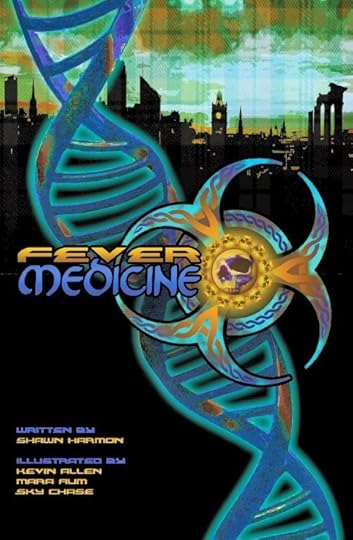
Just a quick heads-up for two imminent launch events for Fever Medicine, a graphics-heavy short novel by Shawn Harmon.
I was lightly involved in making suggestions for the first draft, so I'm biased, but I don't think I went too far when I described it as
'without a doubt, the best Edinburgh-set near-future cyberpunk tartan noir comic-style-illustrated short novel on medical ethics and public health policy … well, ever. It really is very good. With a vivid, violent and fast-moving plot, interspersed with well-placed boxes of factual information and challenging questions, it’s educational as well as entertaining. The illustrations and graphic design were done by highly talented students at the Edinburgh College of Art, and are a credit to the artists and the college.'
Details (with thanks to Joe Gordon and Jennyg):
Where: Pulp Fiction, Bread Street, Edinburgh
When: Friday, 24 January 2014, 19:00-20:00
‘Human Enhancement and Fever Medicine – Launch of an Illustrated Novel’
Shawn Harmon, the author of Fever Medicine, will introduce the genesis of this illustrated novel, followed by a brief reading, and will then invite those present to participate in a dialogue around the ethics of human enhancement. The discussion will be followed by wine and nibbles. Numbers for this event are limited.
Free tickets can be obtained through Event Brite.
Copies of Fever Medicine can be purchased on the evening.
Where: Playfair Library, Old College, University of Edinburgh
When: Monday, 27 January 2014, 18:00-20:00
The University of Edinburgh’s J Kenyon Mason Institute for Medicine, Life Sciences and Law is pleased to announce the following public event:
Title: ‘The Art and Science of Science Communication Through Arts: The Case of Fever Medicine, an Illustrated Novel’
A panel of experts chaired by Professor Jonathan Gibbs of the Edinburgh College of Art will discuss fiction and the arts in science and law communication. Shawn Harmon, law lecturer and author of Fever Medicine, will speak about the creative process which resulted in Fever Medicine, an illustrated novel that explores a range of legal and bioethical issues in a near-future setting. Award winning Scottish author, Ken MacLeod, will talk about the fiction writing process and the science fiction ‘toolkit’. Catherine Southworth, teacher and Communications and Outreach Manager for two EU-funded stem cell research consortia, will discuss science communication and her experience in the development of ‘Hope Beyond Hype’, a comic book format stem cell science teaching tool.
The panel presentation will be followed by an open discussion and thereafter by a wine reception. Numbers for this event are limited.
Free tickets can be obtained through Event Brite.
Copies of Fever Medicine can be purchased on the evening.
Published on January 22, 2014 03:43
December 31, 2013
What I've been doing
I wrote up two book proposals for my agent to send to my editor: one for a long book, the other for three loosely linked shorter books. With that out of the way, I turned to a project which Iain Banks left me to complete. It involves poetry, and you will hear more about it in due course. While carrying it out I came across a few lines from one of my own longer efforts:
I saw you strong and free, like the future.
You saw
what Althusser saw: the structures
replicate across time like molecules in a cheap graphic.
The 'you' addressed here is long gone from my life, and flourishing in her own, but the lines reminded me that I'd never actually read Althusser. So I went and read my old black Penguin University Book paperback of Althusser's For Marx, which turned out to make sense if you take it slowly. This in turn made me take a lot more seriously the critical literary theory that is an essential part of the Napier MA Creative Writing course. (I already knew that learning the theory worked wonders in terms of making students much better and more confident writers, but I'd idly assumed it was a sort of side-effect of lots of hard thinking.) An early consequence of this was a story I wrote this month for Jonathan Strahan's forthcoming anthology Reach for Infinity. I'm delighted to say that '"The Entire Immense Superstructure": An Installation' has been accepted, so yay!
My editor got back to say my publishers were interested in -- in fact, really excited about -- the least developed of my book ideas, so yay! again but of course that means I have to develop it into something solid by the time the Christmas trees go in the brown bins, so no rest for the wicked.
Have a good 2014, everyone.
I saw you strong and free, like the future.
You saw
what Althusser saw: the structures
replicate across time like molecules in a cheap graphic.
The 'you' addressed here is long gone from my life, and flourishing in her own, but the lines reminded me that I'd never actually read Althusser. So I went and read my old black Penguin University Book paperback of Althusser's For Marx, which turned out to make sense if you take it slowly. This in turn made me take a lot more seriously the critical literary theory that is an essential part of the Napier MA Creative Writing course. (I already knew that learning the theory worked wonders in terms of making students much better and more confident writers, but I'd idly assumed it was a sort of side-effect of lots of hard thinking.) An early consequence of this was a story I wrote this month for Jonathan Strahan's forthcoming anthology Reach for Infinity. I'm delighted to say that '"The Entire Immense Superstructure": An Installation' has been accepted, so yay!
My editor got back to say my publishers were interested in -- in fact, really excited about -- the least developed of my book ideas, so yay! again but of course that means I have to develop it into something solid by the time the Christmas trees go in the brown bins, so no rest for the wicked.
Have a good 2014, everyone.
Published on December 31, 2013 06:50
December 23, 2013
Colin WilsonThat fine online magazine Aeon has today publ...
Colin Wilson
That fine online magazine Aeon has today published my article on Colin Wilson, who died earlier this month and for whom I retained a sort of sceptical admiration long after my teenage enthusiasm waned. Reactions to his death suggest that that early enthusiasm and continuing admiration was more widely shared than I'd thought. If you'd like to comment on the piece, please do so there.
Published on December 23, 2013 09:33
September 17, 2013
Mair Manifestin
I have something of a rush of public events in the next few weeks, after which I intend to keep my diary clear (more or less) and focus on writing the next book.
On Wednesday evening I'll be at Edinburgh City Chambers, speaking at a free public seminar organised by the Edinburgh Active Citizenship Group, on the topic of 'A Year to Go to the Big Vote'. Needless to say, I'll be arguing for a No vote. My sparring partner will be pro-independence blogger Kate Higgins. The event runs from 7 - 9 pm, doors (and Word Power bookstall) open 6.30, admission free.
At the end of next week (Sun 29 September), I'll be at Shoreditch Town Hall, taking part in FutureFest, a festival of ideas and discussion about the future, organised by education/innovation charity Nesta; specifically, I'll be speaking in the Sci-Fi Writers' Parliament, in which SF writers including Pat Cadigan, Cory Doctorow and Charles Stross will propose radical legislation for future polities.
The following weekend, on Saturday 5 October, I have a session at the Wigtown Book Festival, talking with Stuart Kelly about my own work and that of Iain Banks.
At 8.30 pm on Wednesday 9 October I'm in a formal debate as part of the Durham Book Festival, on the challenging question 'Is great science great science fiction? Do we create scientific facts or do scientists simply discover what’s already there?' with Professor Tom McLeish (molecular physicist), Professor Patricia Waugh (English studies), and Dr Andrew Crumey (novelist and former physicist).
After all that, the panel on Technology and sutainablity: Kill or Cure? on Saturday 19 October at Battle of Ideas should be an absolute walk in the park, I don't think. But I'm looking forward to it.
On Wednesday evening I'll be at Edinburgh City Chambers, speaking at a free public seminar organised by the Edinburgh Active Citizenship Group, on the topic of 'A Year to Go to the Big Vote'. Needless to say, I'll be arguing for a No vote. My sparring partner will be pro-independence blogger Kate Higgins. The event runs from 7 - 9 pm, doors (and Word Power bookstall) open 6.30, admission free.
At the end of next week (Sun 29 September), I'll be at Shoreditch Town Hall, taking part in FutureFest, a festival of ideas and discussion about the future, organised by education/innovation charity Nesta; specifically, I'll be speaking in the Sci-Fi Writers' Parliament, in which SF writers including Pat Cadigan, Cory Doctorow and Charles Stross will propose radical legislation for future polities.
The following weekend, on Saturday 5 October, I have a session at the Wigtown Book Festival, talking with Stuart Kelly about my own work and that of Iain Banks.
At 8.30 pm on Wednesday 9 October I'm in a formal debate as part of the Durham Book Festival, on the challenging question 'Is great science great science fiction? Do we create scientific facts or do scientists simply discover what’s already there?' with Professor Tom McLeish (molecular physicist), Professor Patricia Waugh (English studies), and Dr Andrew Crumey (novelist and former physicist).
After all that, the panel on Technology and sutainablity: Kill or Cure? on Saturday 19 October at Battle of Ideas should be an absolute walk in the park, I don't think. But I'm looking forward to it.
Published on September 17, 2013 08:42
September 16, 2013
Aboard the GCU Well, You Did Ask For a Concrete Example

Last Wednesday I was at Brunel University for The State of the Culture, a one-day symposium on the Culture books of Iain M. Banks. The campus has changed a lot since I was a postgraduate student there in the late 1970s. New buildings have been added, and others have been retro-fitted. The concrete Brutalist structures that form the hard core of the place are still there, with the famous Lecture Centre a listed building, albeit now garlanded with flowerbeds on its fire-escape and grass and trees on the plaza in front of it. Tower D, where I did research in biomechanics and where I recently housed an entirely imaginary sociology of science department, looks just the same as I remember it, at least from the outside. The most obvious change in the campus is that the male-female ratio is no longer 4:1.
My visit was as a guest of Fairies and Flying Saucers, the university's research cluster on fantasy and science fiction, and they looked after me well: Joseph Norman was at the bus stop to welcome me, and he showed me to the comfortable accommodation of the Lancaster Lodge and then met me in the bar for a pint or two before he and others took me out for a curry.
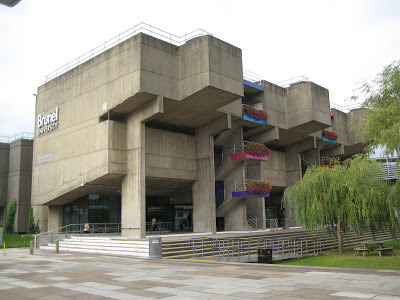
The conference was held in the Antonin Artaud building, and it ran smoothly, with breaks and refreshments at just the right times. My opening talk was billed as the keynote, which it certainly wasn't: despite much preparatory thinking and note-typing, when it came to delivering it I fell between the two wobbly stools of rambling anecdote about the man (and boy) and amateur analysis of the work. However, the audience listened sympathetically and laughed occasionally, and the questions that followed were well asked. SF critic Paul Kincaid was kind about my talk, and gave the whole conference such a good write-up that I really can't better it. (A full report is projected for Foundation issue 116, a special issue on Iain.) Two new books, The Transgressive Iain Banks: Essays on a Writer Beyond Borders and Gothic Dimensions were passed around, and their editor and author respectively each gave well-received and stimulating talks. It's exciting and indeed moving to see so much scholarly interest in Iain's work, coming at it from so many different academic angles.
Joe kept things on schedule, and after the conference finished on time, I had an hour for a reading -- from the opening of Descent -- and a Q&A, all professionally and unobtrusively photographed. Then about twenty of us headed through a light rain to dinner and subsequent pints and conversation at the fine local pub The Malt Shovel, whose very existence I had managed to miss in all my years at Brunel.
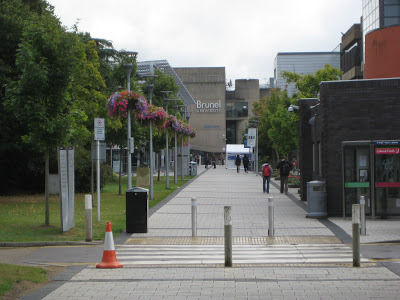
Published on September 16, 2013 02:21
August 6, 2013
Descent cover
Published on August 06, 2013 02:59
July 26, 2013
Use of Calculators
[I've been asked by one or two left publications for a piece about Iain's politics. I've told them I was going to write a blog post on the subject, which they were welcome to use. Here it is. If anyone else wants to use it, please ask.]
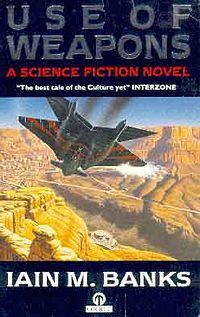 When Iain Banks and I were students back in the early 1970s, I was one of the first readers of Use of Weapons. I seem to recall reading the first draft in weekly instalments as the pages flew from the typewriter, and discussing the unfolding content almost as often. Iain explained that the Culture was his idea of utopia, in which advanced technology, inexhaustible resources and friendly artificial intelligence made possible a society in which nobody had to work and there was no need for money or a separate state apparatus. At the time I was reading with some excitement a slim paperback edited by David McLellan and titled Marx's Grundrisse, a collection of extracts from Marx's notebooks, in which he allowed himself some bolder speculations than he ever saw into print. I explained to Iain that the Culture was very similar to Marx's conception of communism: a stateless and classless society based on automation and abundance.
When Iain Banks and I were students back in the early 1970s, I was one of the first readers of Use of Weapons. I seem to recall reading the first draft in weekly instalments as the pages flew from the typewriter, and discussing the unfolding content almost as often. Iain explained that the Culture was his idea of utopia, in which advanced technology, inexhaustible resources and friendly artificial intelligence made possible a society in which nobody had to work and there was no need for money or a separate state apparatus. At the time I was reading with some excitement a slim paperback edited by David McLellan and titled Marx's Grundrisse, a collection of extracts from Marx's notebooks, in which he allowed himself some bolder speculations than he ever saw into print. I explained to Iain that the Culture was very similar to Marx's conception of communism: a stateless and classless society based on automation and abundance.
Iain was interested and I think persuaded. But, I went on, the Culture on his telling didn't seem to have come about through class struggle, revolution, and the rest. How, then, could it have come about, given that Iain was as sceptical as I was about the likelihood of such a society being handed down by benevolent rulers from above? By way of answer, Iain pointed to his pocket calculator. He said that on his last vacation job, on a construction site, one of the full-time workers had borrowed it and worked his way through a stack of wage slips, to discover that he and his mates weren't getting all the pay they were due. The site workers had taken the result to the management, who duly if perhaps reluctantly shelled out the back pay that was owed. That, Iain said, was how he'd envisaged the Culture coming about. Conflicts of interest between classes and other groups there would be, but the sheer availability of information and computing power would arm the majority with facts and arguments that would enable them to prove, as well as enforce, their claims. The consequent advance in consciousness would allow the opportunities offered by automation and abundance to be grasped, first in imagination then in reality, and make opposition to their realisation irrational, futile, and weak.
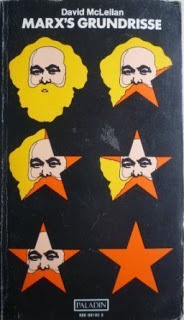 This projection of a democratic, deliberative, and peaceful transition to a co-operative commonwealth wasn't as far removed from Marx's own later views as I thought at the time. I saw Marx through Lenin, Lenin through Trotsky, and -- for that matter --Trotsky through the Trotskyists, and each successive prism lost something of the one before, let alone the original image. Iain respected them all as thinkers, but remained sceptical of any attempt to emulate their practice. He was quite willing to stick his neck out when necessary: he came down to London in 1977 to join the mobilization against the fascist National Front's attempt to march through Lewisham, took his place in a small squad of comrades none of whom he knew but me, and thoroughly enjoyed the fight that ensued. On a later visit he joined me when it was my turn to guard our group's bookshop and offices, which had recently been targeted in an amateurish arson attempt by the fascists. As Iain and I checked the locks on the building's back door, two policemen loomed behind us and tapped our shoulders. It took us some minutes to convince the coppers that we really were there to protect rather than attack the shop. Iain ribbed me about it afterwards:
This projection of a democratic, deliberative, and peaceful transition to a co-operative commonwealth wasn't as far removed from Marx's own later views as I thought at the time. I saw Marx through Lenin, Lenin through Trotsky, and -- for that matter --Trotsky through the Trotskyists, and each successive prism lost something of the one before, let alone the original image. Iain respected them all as thinkers, but remained sceptical of any attempt to emulate their practice. He was quite willing to stick his neck out when necessary: he came down to London in 1977 to join the mobilization against the fascist National Front's attempt to march through Lewisham, took his place in a small squad of comrades none of whom he knew but me, and thoroughly enjoyed the fight that ensued. On a later visit he joined me when it was my turn to guard our group's bookshop and offices, which had recently been targeted in an amateurish arson attempt by the fascists. As Iain and I checked the locks on the building's back door, two policemen loomed behind us and tapped our shoulders. It took us some minutes to convince the coppers that we really were there to protect rather than attack the shop. Iain ribbed me about it afterwards:
'I bet that's the first time you've ever had to say, "Honestly, officer, I really am a left-wing extremist ..."'
However friendly he was to the radical left, Iain had little interest in relating the long-range possibility of utopia to radical politics in the here and now. As he saw it, what mattered was to keep the utopian possibility open by continuing technological progress, especially space development, and in the meantime to support whatever policies and politics in the real world were rational and humane. For Iain that meant voting Labour. After the party mutated into New Labour he switched his practical vote to the Scottish National Party and his protest vote to the Scottish Socialists and (I think) the Greens. Even before then, in the early to mid 1990s, he'd come around to the view that Scotland would never be safe from the ravages of Tory governments it hadn't voted for unless it separated from England. This support for independence didn't come from nationalism but from reformism, and from a life-long, heart-felt hatred for the Conservative and Unionist Party.
In Iain's view, popular access to information was decisive to any hope of progress, and control of information was central to the power of the ruling class. One of his few intellectual heroes was Noam Chomsky, who has for decades argued and documented this over and over. Iain made a point of being well-informed himself, and seemed to have read the Guardian from cover to cover every day. The most radical writings -- Chomsky's apart -- that he ever enthused about to me were those of John Kenneth Galbraith, George Monbiot and Will Hutton. Iain valued the far left mainly as a source of information that even the Guardian was likely to gloss over. He followed my own adventures and misadventures in Marxism with a sort of sympathetic scepticism, always keen to read whatever rag I was flogging at any given time, and to listen to my explanations of why which paper I was selling sometimes changed over the years. It was my later explorations of libertarian thought that most sorely tried his patience. I could never persuade him that libertarianism was anything but a shill for corporate interests: a common misconception, and one that many libertarians have worked hard to confirm.
In his view, the left's most stupid and repeated mistake was to accept that 'my enemy's enemy is my friend,' which he saw as at the bottom of most of the left's disasters. He had no illusions in existing socialism, and no hopes for the better in its collapse. He opposed every war the British state waged in his lifetime, with the one exception of NATO's war over Kosovo, which he argued for before it happened and never repudiated. Fortunately, this wasn't the first step on a slippery slope. He was even more vehemently opposed than I was to the attack on Iraq -- I tried to at least see a certain logic to it from the imperialist point of view, whereas he saw it as utter folly and madness from the moment it was mooted, an adventure that would sow destruction, multiply terrorism, and do incalculable harm to the interests and security of the UK and US.
He blamed Blair absolutely for the Iraq war, and never forgave or forgot the crime. Anger over what was going on in the Middle East impelled him to his two best-known political gestures: cutting up his passport and sending it to 10 Downing Street, and refusing to have his own books published in Israel. The former action was mocked, the latter attacked. Iain took not a blind bit of notice.
In summary, Iain's political views were, by and large, what you'd expect from an Old Labour supporter and Guardian reader with an informed interest in the analyses of the radical left. What was perhaps more unusual than his views was the consistency and tenacity with which he held them, and his confidence that they must in the long run prevail if civilization was to survive. He saw quite clearly that events weren't going the way he would have liked them to, but never saw any reason to revise his reckoning that neoliberalism just didn't add up.
 When Iain Banks and I were students back in the early 1970s, I was one of the first readers of Use of Weapons. I seem to recall reading the first draft in weekly instalments as the pages flew from the typewriter, and discussing the unfolding content almost as often. Iain explained that the Culture was his idea of utopia, in which advanced technology, inexhaustible resources and friendly artificial intelligence made possible a society in which nobody had to work and there was no need for money or a separate state apparatus. At the time I was reading with some excitement a slim paperback edited by David McLellan and titled Marx's Grundrisse, a collection of extracts from Marx's notebooks, in which he allowed himself some bolder speculations than he ever saw into print. I explained to Iain that the Culture was very similar to Marx's conception of communism: a stateless and classless society based on automation and abundance.
When Iain Banks and I were students back in the early 1970s, I was one of the first readers of Use of Weapons. I seem to recall reading the first draft in weekly instalments as the pages flew from the typewriter, and discussing the unfolding content almost as often. Iain explained that the Culture was his idea of utopia, in which advanced technology, inexhaustible resources and friendly artificial intelligence made possible a society in which nobody had to work and there was no need for money or a separate state apparatus. At the time I was reading with some excitement a slim paperback edited by David McLellan and titled Marx's Grundrisse, a collection of extracts from Marx's notebooks, in which he allowed himself some bolder speculations than he ever saw into print. I explained to Iain that the Culture was very similar to Marx's conception of communism: a stateless and classless society based on automation and abundance.Iain was interested and I think persuaded. But, I went on, the Culture on his telling didn't seem to have come about through class struggle, revolution, and the rest. How, then, could it have come about, given that Iain was as sceptical as I was about the likelihood of such a society being handed down by benevolent rulers from above? By way of answer, Iain pointed to his pocket calculator. He said that on his last vacation job, on a construction site, one of the full-time workers had borrowed it and worked his way through a stack of wage slips, to discover that he and his mates weren't getting all the pay they were due. The site workers had taken the result to the management, who duly if perhaps reluctantly shelled out the back pay that was owed. That, Iain said, was how he'd envisaged the Culture coming about. Conflicts of interest between classes and other groups there would be, but the sheer availability of information and computing power would arm the majority with facts and arguments that would enable them to prove, as well as enforce, their claims. The consequent advance in consciousness would allow the opportunities offered by automation and abundance to be grasped, first in imagination then in reality, and make opposition to their realisation irrational, futile, and weak.
 This projection of a democratic, deliberative, and peaceful transition to a co-operative commonwealth wasn't as far removed from Marx's own later views as I thought at the time. I saw Marx through Lenin, Lenin through Trotsky, and -- for that matter --Trotsky through the Trotskyists, and each successive prism lost something of the one before, let alone the original image. Iain respected them all as thinkers, but remained sceptical of any attempt to emulate their practice. He was quite willing to stick his neck out when necessary: he came down to London in 1977 to join the mobilization against the fascist National Front's attempt to march through Lewisham, took his place in a small squad of comrades none of whom he knew but me, and thoroughly enjoyed the fight that ensued. On a later visit he joined me when it was my turn to guard our group's bookshop and offices, which had recently been targeted in an amateurish arson attempt by the fascists. As Iain and I checked the locks on the building's back door, two policemen loomed behind us and tapped our shoulders. It took us some minutes to convince the coppers that we really were there to protect rather than attack the shop. Iain ribbed me about it afterwards:
This projection of a democratic, deliberative, and peaceful transition to a co-operative commonwealth wasn't as far removed from Marx's own later views as I thought at the time. I saw Marx through Lenin, Lenin through Trotsky, and -- for that matter --Trotsky through the Trotskyists, and each successive prism lost something of the one before, let alone the original image. Iain respected them all as thinkers, but remained sceptical of any attempt to emulate their practice. He was quite willing to stick his neck out when necessary: he came down to London in 1977 to join the mobilization against the fascist National Front's attempt to march through Lewisham, took his place in a small squad of comrades none of whom he knew but me, and thoroughly enjoyed the fight that ensued. On a later visit he joined me when it was my turn to guard our group's bookshop and offices, which had recently been targeted in an amateurish arson attempt by the fascists. As Iain and I checked the locks on the building's back door, two policemen loomed behind us and tapped our shoulders. It took us some minutes to convince the coppers that we really were there to protect rather than attack the shop. Iain ribbed me about it afterwards:'I bet that's the first time you've ever had to say, "Honestly, officer, I really am a left-wing extremist ..."'
However friendly he was to the radical left, Iain had little interest in relating the long-range possibility of utopia to radical politics in the here and now. As he saw it, what mattered was to keep the utopian possibility open by continuing technological progress, especially space development, and in the meantime to support whatever policies and politics in the real world were rational and humane. For Iain that meant voting Labour. After the party mutated into New Labour he switched his practical vote to the Scottish National Party and his protest vote to the Scottish Socialists and (I think) the Greens. Even before then, in the early to mid 1990s, he'd come around to the view that Scotland would never be safe from the ravages of Tory governments it hadn't voted for unless it separated from England. This support for independence didn't come from nationalism but from reformism, and from a life-long, heart-felt hatred for the Conservative and Unionist Party.
In Iain's view, popular access to information was decisive to any hope of progress, and control of information was central to the power of the ruling class. One of his few intellectual heroes was Noam Chomsky, who has for decades argued and documented this over and over. Iain made a point of being well-informed himself, and seemed to have read the Guardian from cover to cover every day. The most radical writings -- Chomsky's apart -- that he ever enthused about to me were those of John Kenneth Galbraith, George Monbiot and Will Hutton. Iain valued the far left mainly as a source of information that even the Guardian was likely to gloss over. He followed my own adventures and misadventures in Marxism with a sort of sympathetic scepticism, always keen to read whatever rag I was flogging at any given time, and to listen to my explanations of why which paper I was selling sometimes changed over the years. It was my later explorations of libertarian thought that most sorely tried his patience. I could never persuade him that libertarianism was anything but a shill for corporate interests: a common misconception, and one that many libertarians have worked hard to confirm.
In his view, the left's most stupid and repeated mistake was to accept that 'my enemy's enemy is my friend,' which he saw as at the bottom of most of the left's disasters. He had no illusions in existing socialism, and no hopes for the better in its collapse. He opposed every war the British state waged in his lifetime, with the one exception of NATO's war over Kosovo, which he argued for before it happened and never repudiated. Fortunately, this wasn't the first step on a slippery slope. He was even more vehemently opposed than I was to the attack on Iraq -- I tried to at least see a certain logic to it from the imperialist point of view, whereas he saw it as utter folly and madness from the moment it was mooted, an adventure that would sow destruction, multiply terrorism, and do incalculable harm to the interests and security of the UK and US.
He blamed Blair absolutely for the Iraq war, and never forgave or forgot the crime. Anger over what was going on in the Middle East impelled him to his two best-known political gestures: cutting up his passport and sending it to 10 Downing Street, and refusing to have his own books published in Israel. The former action was mocked, the latter attacked. Iain took not a blind bit of notice.
In summary, Iain's political views were, by and large, what you'd expect from an Old Labour supporter and Guardian reader with an informed interest in the analyses of the radical left. What was perhaps more unusual than his views was the consistency and tenacity with which he held them, and his confidence that they must in the long run prevail if civilization was to survive. He saw quite clearly that events weren't going the way he would have liked them to, but never saw any reason to revise his reckoning that neoliberalism just didn't add up.
Published on July 26, 2013 07:13
The State of the Culture
Faeries and Flying Saucers, a fantasy and science fiction research cluster based at Brunel University, in association with the Brunel Centre for Contemporary Writing, presents a day of presentations and discussion on the 'Culture' series by Iain M. Banks (1954 - 2013).
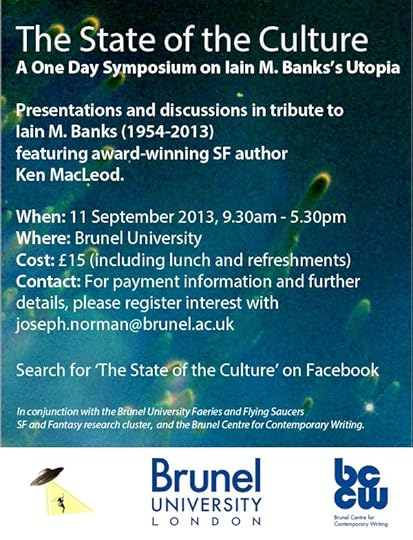

Published on July 26, 2013 06:05
July 1, 2013
Celebrating the work of Iain [M.] Banks
From Edinburgh City of Literature comes a short season of events 'celebrating the work of author Iain [M] Banks' this summer, culminating with an event at the Edinburgh International Book Festival. They include a screening of The Crow Road at the Filmhouse, and an exhibition of SF poetry at the Scottish Poetry Library. I'm taking part in the (already sold-out) Book Festival event, along with Ian Rankin and Val McDermid. I'm also taking part in Illicit Ink's This Side of Paradise, an evening of utopian readings next Sunday at the Bongo Club:
Brought to you by the folk who like to conduct gruesome fictional experiments on stage and play in the dark, This Side of Paradise will be a heaven on earth. Compèring the night is science fiction visionary Andrew J. Wilson. Bringing the paradise to life with original stories and instruments of science are writers Ken MacLeod, Ariadne Cass-Maran, Erin McElhinney, Halsted Bernard, Hal Duncan and Tom Moore.
Published on July 01, 2013 06:41
Ken MacLeod's Blog
- Ken MacLeod's profile
- 762 followers
Ken MacLeod isn't a Goodreads Author
(yet),
but they
do have a blog,
so here are some recent posts imported from
their feed.


